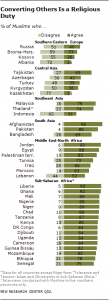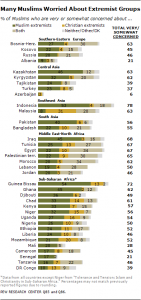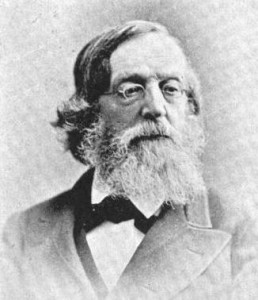First of all, here it is in case you missed it.
Sam Harris has written a lengthy blog post offering his perspective not only on his interaction with Ben Affleck but what he feels motivated Affleck’s hostile response.
After the show, a few things became clear about Affleck’s and Kristof’s views. Rather than trust poll results and the testimony of jihadists and Islamists, they trust the feeling that they get from the dozens of Muslims they have known personally. As a method of gauging Muslim opinion worldwide, this preference is obviously crazy. It is nevertheless understandable. On the basis of their life experiences, they believe that the success of a group like ISIS, despite its ability to recruit people by the thousands from free societies, says nothing about the role that Islamic doctrines play in inspiring global jihad. Rather, they imagine that ISIS is functioning like a bug light for psychopaths—attracting “disaffected young men” who would do terrible things to someone, somewhere, in any case. For some strange reason these disturbed individuals can’t resist an invitation to travel to a foreign desert for the privilege of decapitating journalists and aid workers. I await an entry in the DSM-VI that describes this troubling condition.
Take it for what it’s worth, but I do sense a true desire to dialogue about these issues, and Harris certainly displayed far more grace toward Affleck in this piece than he received on air. Unlike some of the other “new atheists,” such as Richard Dawkins, who is prone to throwing his hands in the air, dumbfounded as to how anyone could possibly disagree with him, Harris seems more inclined and better equipped to at least try to understand the intellectual and emotional factors that may be motivating those who disagree with him and seek to dialogue on that level.
UPDATE 10/10/2014: You can also watch Harris respond here.
Nicolas Kristof, who was also on the show, wrote this response. A brief snippet:
Beware of generalizations about any faith because they sometimes amount to the religious equivalent of racial profiling. Hinduism contained both Gandhi and the fanatic who assassinated him. The Dalai Lama today is an extraordinary humanitarian, but the fifth Dalai Lama in 1660 ordered children massacred “like eggs smashed against rocks.”
Christianity encompassed the Rev. Dr. Martin Luther King Jr. and also the 13th century papal legate who in France ordered the massacre of 20,000 Cathar men, women and children for heresy, reportedly saying: Kill them all; God will know his own.
Bill Maher also weighed in.
We’re liberals! We’re liberals. We’re not crazy tea-baggers, y’know, and so it’s kind of hard to be making this case — based on facts, based on polling, I think based on what everybody really knows… I mean, do the people arguing with us, would they really open a lesbian art gallery in Ramallah? [Laughs] Or Karachi? Or Cairo? I don’t know if they would back up what they’re saying with actions.
We are not bigoted people. On the contrary, we’re trying to stand up for the principles of liberalism! And so, y’know, I think we’re just saying we need to identify illiberalism wherever we find it in the world, and not forgive it because it comes from [a group] people perceive as a minority.
So far, no follow-up word from Affleck. Perhaps we can look forward to it on a future Smodcast episode.
In terms of outside commentary, I like this piece from Adam Ericksen of the Raven Foundation, who says,
I agree with Bill Maher and Sam Harris that we have to criticize bad ideas. But the “mother lode of bad ideas” doesn’t come from Islam. That’s an arrogant claim that will only kindle the spirit of violence and scapegoating in us. The “mother lode of bad ideas” is scapegoating violence.
The best alternative to the “mother lode of bad ideas” is not more blaming and scapegoating. Rather, it’s to follow in the tradition laid before us by the Jewish, Christian, Islamic religions that commands us to “To love our neighbors—that is, our fellow human beings—regardless of race, religion, or cultural background as we love ourselves.”
This piece by Peter Beinart also provides some historical context by providing parallel between Harris’s “motherlode of bad ideas” critique of Islam and earlier critiques of Communism.
Schlesinger’s point then, and Maher’s now, is that the enemies of liberals do not reside only on the right. In the 1930s and 1940s, some liberals grew so focused on the struggles against fascism and racism—struggles in which communists proved staunch allies—that they refused to acknowledge Joseph Stalin’s crimes. Today, some liberals are so focused on the struggle against American militarism and Islamophobia that they can’t muster much outrage against ISIS. According to Schlesinger, occupying the Vital Center means opposing totalitarianism wherever you find it, regardless of whether it claims the mantle of progressivism, as the Soviet Union did during his time, or anti-imperialism, as jihadists do now.
So far, so good. Where Maher goes wrong is in forgetting two other lessons of the liberal anti-totalitarian tradition. The first is to be precise about what you’re opposing. The second, to not get so carried away with your own virtue that you end up justifying terrible crimes.
When Affleck told Maher that America has “killed more Muslims than they’ve killed us by an awful lot … and somehow we’re exempt from these things because they’re not really a reflection of what we believe in. We did it by accident,” he was making a crucial point. As the great liberal Cold War theologian Reinhold Niebuhr stressed, nations, like individuals, are often unable to acknowledge the degree to which selfish interest infects their supposed pursuit of high principle. Restraining the evil that lurks within our own culture requires facing our own history of, and ongoing capacity for, terrible crimes. It requires trying to see largely Christian America the way we are seen by the Muslims whose cities we have bombed. By contrast, declaring that the essential barbarism in today’s world lies elsewhere—not even just in a foreign regime or movement but in an entire religion—lets us off easy.
Another helpful resource in terms of getting a handle on what the world’s Muslims actually believe about Sharia is this recent Pew study, which polled 38,000 Muslims in 39 countries. Below are a few highlights.
On the disturbing side, not only do a majority of Muslims believe Sharia is the revealed word of God, they also believe there is only one authoritative interpretation. And for most Muslims, not only is Islam viewed as the only path to heaven, converting others to Islam is a religious duty. They also see an inherent conflict between their religion and modern society. This seems to suggest a certain intractability in terms of dialogue.
However, the vast majority of Muslims also believe it is good that other people are very free to practice their own faith. Furthermore, a significant number of Muslims believe they have a lot in common with Christianity, and those who view a hostile relationship between Christianity and Islam are in the minority. Finally, a majority of Muslims also expressed concern over religions extremism.
This is just a brief sampling of the extensive study, which covers everything from interfaith dialogue to politics to gender issues and the relative value of Hollywood movies.
There are certainly several causes for concern, such as the significant number of Muslims who think people should be killed for leaving the faith. But I also see a lot of room for dialogue and common ground if we are truly willing to listen and not talk past each other, use inflammatory language, or become morally outraged at the slightest criticism of our chosen position.
You may also want to watch this documentary Inside Islam (free online). I haven’t seen it yet but it comes highly recommended.
Finally, just to lighten things up a little, there’s this.




















